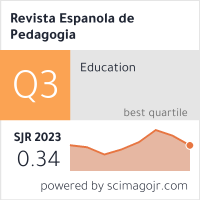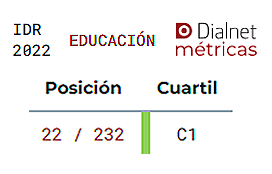La educación moral a partir de Levinas: otro modelo educativo
DOI
10.22550/REP80-2-2022-01
Abstract
This work takes Levinasian ethics and anthropology as sources to inspire a new pedagogical discourse and educational praxis in the field of moral education. In this paradigm, the human being is a historical, situational being that is open to the other from its vulnerability. Accordingly, moral education becomes a compassionate, welcoming response to the other in its situation of special need. The authors highlight the close link between education and a particular conception of the human being and how it relates to others. To ask about education is to ask about the human. Levinasian ethics do not back setting specific guidelines for educational action; they only justify the creation of an educational climate (ethos) in classrooms that favours openness to the other through action in the following areas of intervention: pupils’ experience as a space of encounter; teachers’ testimony; attention to students in their context; the need to examine the sense of responsibilty further; and the pedagogy of donation. Moral education, based on Levinasian ethics, can serve to increase alerity and humanise the school and society.
Please, cite this article as follows: Ortega Ruiz, P., & Romero Sánchez, E. (2022). La educación moral a partir de Levinas: otro modelo educativo | Moral education from Levinas: Another educational model. Revista Española de Pedagogía, 80 (282), 233-249. 10.22550/REP80-2-2022-01
Referencias | References
Biesta, G. (2010). Education after the death of the subject: Levinas and the Pedagogy of Interruption. In Leonardo Zeus (Ed.), Handbook of Cultural Politics and Education. Contexts in Education. Volume 4 (pp. 289-300). Sense Publishers.
Butler, J. (2006). Vida precariat [Precarious life]. Paidós.
Chinnery, A. (2003). Aesthetics of surrender: Levinas and the disruption of agency in moral education. Studies in Philosophy and Education, 22 (1), 5-17. https://doi.org/10.1023/A:1021129309618
Delgado, I. (2010). Perspectiva antropológica de la educación. Visión desde la filosofía dialógica y personalista [Anthropological perspective of education. Vision from the dialogic and person-alist philosophy]. revista española de pedagogía, 68 (247), 479-495.
Derrida, J. (1995). Dar (el) tiempo [Give (the) time]. Paidós.
González Rodríguez Arnáiz, G. (2002). La interculturalidad como categoría moral [Interculturality as a moral category]. In G. González Rodríguez Arnáiz (Coord.), El discurso intercultural. Prolegómenos a una filosofía intercultural (pp. 77-106). Biblioteca Nueva.
Hegel, G. W. (2005). Lecciones sobre la filosofía de la historia universal [Lessons on the philosophy of world history]. Tecnos.
Lee, S. (2019). Ethics is an optics: Ethical practicality and the exposure of teaching. Journal of Philosophy of Education, 53 (1), 145-164. https://doi.org/10.1111/1467-9752.12314
Levinas, E. (1993). Entre nosotros [Amongst us]. Pre-Textos.
Levinas, E. (1998). La huella del otro [The other’s footprint]. Taurus.
Levinas, E. (2000). Totality and infinity: An essay on exteriority. Duquesne University Press.
Levinas, E. (2008). Nombres propios [Proper nouns]. Fundación Enmanuel Mounier.
Levinas, E. (2011). De otro modo que ser o más allá de la esencia [Other than being or beyond essence]. Ediciones Sígueme.
Levinas, E. (2014). Alteridad y trascendencia [Alter-ity and transcendence]. Arena Libros.
Levinas, E. (2015). Ética e infinito [Ethics and infin-ity]. Edit. Machado.
Martín, X., Gijón, M., & Puig Rovira, J. M.ª (2019). Pedagogía del don. Relación y servicio en educación [Pedagogy of the gift. Relationship and service in education]. Estudios sobre Educación, 37, 51-68. 10.15581/004.37.51-68
Matanky, E. (2018). The temptation of pedagogy: Levinas´s educational thought from his philosophical and confesional writings. Journal of Philosophy of Education, 52 (3), 412-427. https://doi.org/10.1111/1467-9752.12302
Mèlich, J. C. (2002). Filosofía de la finitud [Philosophy of finitude]. Herder.
Mèlich, J. C. (2010). Ética de la compasión [Ethics of compassion]. Herder.
Mèlich, J. C. (2021). La fragilidad del mundo: Ensayo sobre un tiempo precario [The fragility of the world: Essay on a precarious time.]. Tusquets.
Ortega, P. (2010). Educar es responder a la pregunta del otro. Edetania, 37, 13-31.
Ortega, P. (2016). La ética de la compasión en la pedagogía de la alteridad [The ethics of compassion in the pedagogy of alterity]. revista española de pedagogía, 74 (264), 243-264.
Ortega, P., & Romero, E. (2019). A la intemperie. Conversaciones desde la pedagogía de la alteridad [Out in the open. Conversations from the pedagogy of otherness]. Octaedro.
Ortega, P., & Romero, E. (2021). El valor de la experiencia del alumno como contenido educativo [The value of the student’s experience as educational content]. Teoría de la Educación. Revista Interuniversitaria, 33 (1), 89-110. https:// doi.org/10.14201/teri.23615
Pagès, A. (2016). Actualidad de la Hermenéutica como Filosofía de la Educación [Actuality of Hermeneutics as Philosophy of Education]. revista española de pedagogía, 74 (264), 265-281.
Pallarés, M. (2020). Educación humanizada. Una aproximación a partir del legado de Heinrich Rombach [Humanized education. An approach based on the legacy of Heinrich Rombach]. Estudios Sobre Educación, 38, 9-27. https://doi. org/10.15581/004.38.9-27
Pérez-Guerrero, J. (2016). Ser humano como tarea. Ideas para una antropología de educación de inspiración clásica [The human being as a task. Ideas for a Classically-inspired anthropology of education]. revista española de pedagogía, 74 (264), 227-241.
Sánchez-Rojo, A. (2019). Pedagogía de la atención para el siglo xxi: más allá de una perspectiva psicológica [Pedagogy of attention for the twenty-first century: beyond a psychological perspective]. revista española de pedagogía, 77 (274), 421-436.
Santos, M. (2013). Educación y construcción del Self en la Filosofía Helenística según Michel Foucault [Education and Construction of Self in Hel-lenistic philosophy by Michel Foucault]. revista española de pedagogía, 71 (256), 479-492.
Standish, P. (2020). Lines of testimony. Journal of Philosophy of Education, 54 (2), 319-339. https://doi.org/10.1111/1467-9752.12413
Todd, S. (2003). Learning from the other: Levinas, psychoanalysis, and ethical possibilities in education. State University of New York Press.
Todd, S. (2016). Education Incarnate. Educational Practice and Theory, 48 (4), 405-417. http://dx. doi.org/10.1080/00131857.2015.1041444
Toumayan, A. (2004). “I More than the Others”: Dostoevsky and Levinas. Yale French Studies, 104, 55–66. 10.2307/3182504
Waldenfels, B. (2015). La ética responsiva entre la respuesta y la responsabilidad [Responsive ethics between responsiveness and responsibility]. Apeiron, 3, 205-214.
Zamora, J. A. (2004). T. W. Adorno. Pensar contra la barbarie. Trotta.
Zhao, G. (2012). Levinas and the mission of education. Educational Theory, 62 (6), 659-675. http://dx.doi.org/10.1111/edth.12003
Zhao, G. (2014). Freedom reconsidered: het-eronomy, open subjectivity, and the ‘gift of teaching’. Studies in Philosophy and Education, 33 (5), 510-524. 10.1007/ s11217-013-9401-4
Citación recomendada | Recommended citation
Ortega Ruiz, P. & Romero Sánchez, E. (2022). La educación moral a partir de Levinas: otro modelo educativo | Moral education from Levinas: Another educational model. Revista Española de Pedagogía, 80 (282), 233-249. 10.22550/REP80-2-2022-01
Licencia Creative Commons | Creative Commons License
Esta obra está bajo una licencia internacional Creative Commons Atribución-NoComercial 4.0.
This work is licensed under a Creative Commons Attribution-NonCommercial 4.0 International License


 https://orcid.org/0000-0002-3882-0544
https://orcid.org/0000-0002-3882-0544





